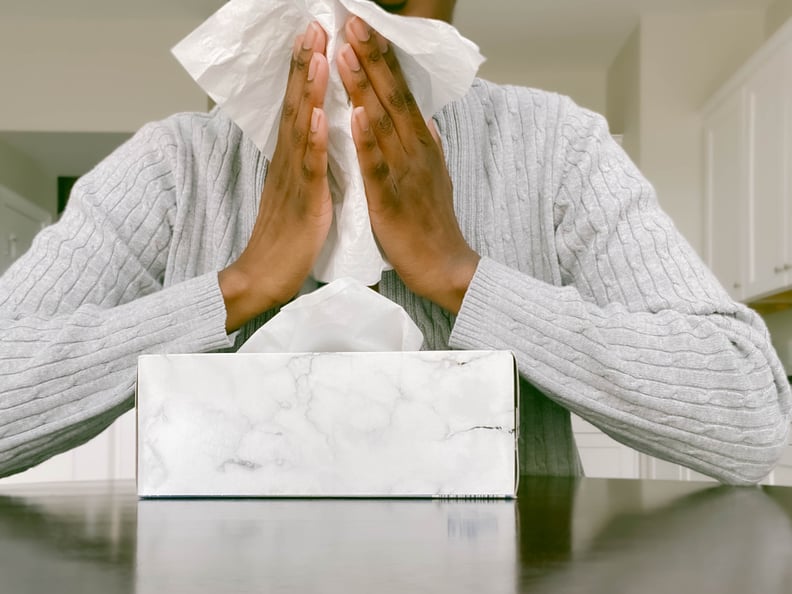When to Worry About a Nosebleed, According to an ENT

If you’ve ever had a nosebleed, you know how awful they can be in the moment. From starting suddenly and seemingly out of nowhere to the annoying, gross mess that follows, dealing with nosebleeds can be a royal pain. From someone who has dealt with nosebleeds in the past, these spontaneous nuisances can undoubtedly impact the trajectory of your day.
Nosebleeds, medically known as epistaxis, most commonly occur due to nasal dryness. Though we are susceptible to nasal dryness year-round, it is most likely to occur during the winter, due to the heated air from inside our living and working spaces, per Harvard Medical School. Though inconvenient, nosebleeds are usually not a reason to worry or an indicator that you have an underlying health condition. Still, they can cause some panic. Ahead, an otolaryngologist weighs in on what causes nosebleeds, when to worry about one, and how to manage them.
Experts Featured in This Article:
Nicole Aaronson, MD, is a board-certified otolaryngologist with Nemours Children’s Health of Delaware.
What Is a Nosebleed?
A nosebleed, or epistaxis, as it’s medically called, is essentially “a loss of blood from the tissue that lines the inside of your nose,” per the Cleveland Clinic. It can occur in both nostrils, but usually takes place in one nostril. “About 60% of people will have at least one nosebleed in their lifetime. Only about 10% of cases are severe enough to require medical treatment,” the Clinic reports.
What Causes Nosebleeds?
Nosebleeds can be caused by a number of things, but most commonly dryness. “Hot, low-humidity climates or heated indoor air cause dry air. Both environments cause your nasal membrane (the delicate tissue inside your nose) to dry out and become crusty or cracked,” according to the Cleveland Clinic. “This makes it more likely to bleed when rubbed or picked or when blowing your nose.”
Nosebleeds that aren’t caused by dryness are typically a direct result of finger trauma (i.e. nose picking) or, in some cases, a deviated septum, according to Nicole Aaronson, MD, a board-certified otolaryngologist with Nemours Children’s Health of Delaware. “The anterior nasal septum has many small branching blood vessels,” Dr. Aaronson tells PS. “Unlike in most of the body, these vessels aren’t covered with skin and subcutaneous tissue but rather run right in the surface of the mucous membranes. This makes them extra susceptible to injury from dry air, nose rubbing, and nasal drainage.”
Other common reasons for a nosebleed, per the Cleveland Clinic, include:
- Infections
- Allergies
- Blood-thinning medications
- Chemical irritants
- High altitudes
- Nasal sprays
- Recreational drug use
When to Worry About a Nosebleed
Typically, nosebleeds will only last between five to 10 minutes and can be managed at home. However, Dr. Aaronson suggests seeing a physician if any of the following are true:
- The nosebleed lasts more than 20 minutes.
- The nosebleed results in the loss of a cupful (8 oz.) or more of blood.
- The nosebleeds are frequent and affect your daily activities and quality of life.
- You’ve experienced recent facial trauma and your nose continues to bleed frequently, even several days after the injury.
- You have a family history of a blood-vessel disorder, such as hereditary hemorrhagic telangiectasia (HHT), and regularly experience nosebleeds.
How to Treat a Nosebleed
In the case that you experience a nosebleed, don’t panic. Dr. Aaronson recommends the following as a first line of defense: tilt the head slightly forward and pinch over the soft part of the nose for 10 minutes. Have a tissue nearby in case you need to clean up a mess. The Cleveland Clinic recommends a similar strategy, adding that you can also apply an ice pack to the bridge of your nose to further help narrow blood vessels and spray an over-the-counter decongestant to the bleeding nostril. Once the bleeding stops, try to avoid bending over, straining or lifting anything heavy, and rubbing or blowing your nose for the next few days.
How to Prevent a Nosebleed
No one likes to experience a nosebleed frequently or even semi-frequently. If you get them somewhat often, Dr. Aaronson recommends the following tips for keeping nosebleeds at bay:
- Using nasal saline several times a day
- Applying Vaseline to the very front of the septum in the morning and at night. “Keeping the nose moist makes a big difference,” she says.
- A humidifier doesn’t hurt if you have an occasional nosebleed. “Humidifiers are great for keeping a general level of moisture in the air, especially in the winter months,” Dr. Aaronson says. “However, when someone is having a lot of nosebleeds, humidifiers usually don’t provide a high enough concentration of moisture right to the nose to be helpful.”
Ultimately, if you have concerns about your nosebleeds, bring those up to a healthcare provider. They’ll be able to assess your symptoms and weigh in on a diagnosis and treatment options.
— Additional reporting by Alexis Jones
Alexis Jones is the senior health and fitness editor at PS. Her passions and areas of expertise include women’s health and fitness, mental health, racial and ethnic disparities in healthcare, and chronic conditions. Prior to joining PS, she was the senior editor at Health magazine. Her other bylines can be found at Women’s Health, Prevention, Marie Claire, and more.
Alicia Geigel is a contributing writer for PS. She has worked as a freelance writer with several online blogs and publications for over five years, including: People.com, Better Homes & Gardens, Martha Stewart, and NickiSwift.



